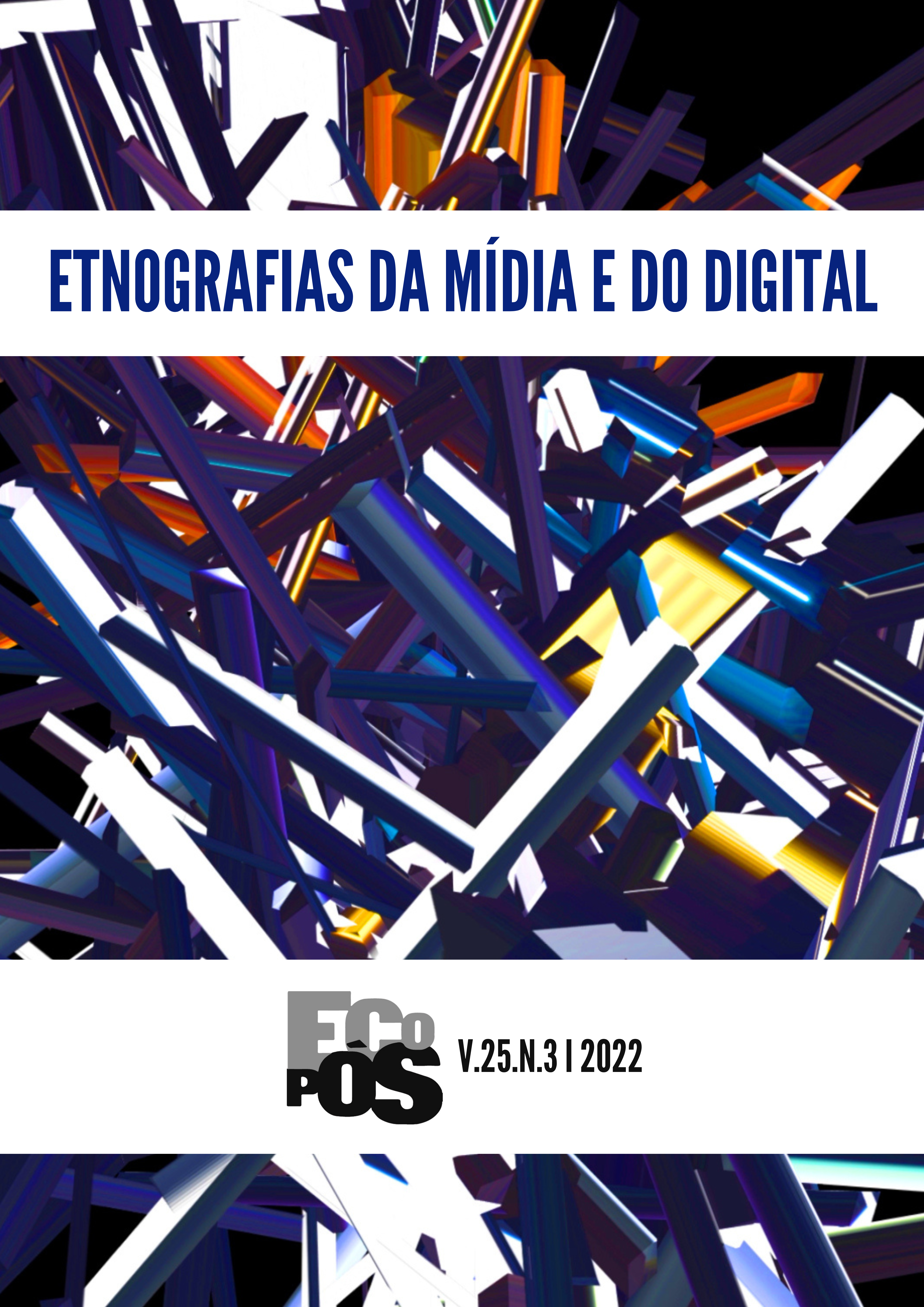Uma etnografia sobre desconexão voluntária:
motivações e estratégias para desconectar
Palavras-chave:
Culturas Digitais, Detox Digital, Etnografia, Etnografia para InternetResumo
As narrativas ao redor do consumo das tecnologias são marcadas por ambivalências que encaram as mídias digitais como benéficas e prejudiciais. Diante disso, movimentos contemporâneos como a desconexão voluntária apresentam-se como capazes de equilibrar o consumo de redes sociais e smartphones. Logo, a partir de uma etnografia para internet (Hine, 2015), este estudo objetiva identificar e analisar os principais motivadores para o exercício de desconexão digital voluntária e suas imbricações na realidade de um grupo de participantes. Para isso, o estudo traz novas perspectivas para as três razões para estar desconectado identificadas no trabalho de Trine Syvertsen (2020), sendo estas a presença, a produtividade e a privacidade. Por fim, o trabalho de campo, ainda em desenvolvimento, revela uma trama de experiências heterogêneas que são marcadas na realidade de cada participante, além de um conjunto de estratégias para a manutenção do bem-estar dos indivíduos que buscam estar desconectados.
Downloads
Referências
BAUMAN, Zygmunt. Modernidade Líquida. Rio de Janeiro: Zahar, 2003.
BENJAMIN, R. Race after Technology: Abolitionist Tools for the New Jim Code. Cambridge: Polity Press, 2019.
BIEHL, João. Do certo ao Inacabado: uma aproximação com a criação etnográfica. In. Mana, v. 26, n. 3, 2020. p. 1-33.
CERTEAU, Michel de. A invenção do cotidiano I: as artes do fazer. Petrópolis: Vozes, 1994.
HINE, Christine. Ethnography for the Internet: Embedded, Embodied and Everyday. London: Bloomsbury, 2015.
LANIER, Jaron. Dez argumentos para você deletar agora as suas redes sociais. Rio de Janeiro: Intrínseca, 2018.
MILLER, Daniel; COSTA, Elisabetta; HAYNES, Nell; MCDONALD, Tom; NICOLESCU, Razvan; SINANAN, Jolynna; SPYER, Juliano; VENKATRAMAN, Shriram. How the World Change the Social Media. London: UCLPRESS. 2016.
MILLER. Daniel; HORST A. Heather. O digital e o humano: prospecto para uma antropologia digital. In: Parágrafo,. v. 2, n. 3, jul/dez de 2015.
MILLER, Daniel; ABED RABHO, Laila; AWONDO, Patrick; DE VIRES, Maya; DUQUE, Marília; GARVEY, Pauline; HAAPIO-KIRK, Laura; HAWKINS, Charlotte; OTEAGUI, Alfonso; WALTON, Shireen; WANG, Xinyuan. The Global Smartphone: Beyond a youth technology. London: UCL PRESS. 2021.
PAASONEN, Susanna. Dependent, Distracted, Bored: Affective Formations in Networked Media. Cambridge: MIT Press, 2021.
PEIRANO, Mariza. Etnografia não é Método. Horizontes Antropológicos, a. 20, n. 42, p. 377-391, 2014. Disponível em: http://www.scielo.br/pdf/ha/v20n42/15.pdf. Acessado em 10 de abril de 2017.
SYVERTSEN, Trine. Media Resistance: Protest, Dislike, Abstention. Palgrave Macmillan, 2017. DOI: 10.1007/978-3-319-46499-2
SYVERTSEN, Trine; KARLSEN, Faltin; BØLLING, Jørgen. Digital detox på norsk. In: Norsk Medietidsskrift, v. 26, n. 2, 2019. p. 1-18. Disponível em: https://www.researchgate.net/publication/333730886_Digital_detox_pa_norsk. Acesso em 11/04/2020.
_______. Digital Detox: The politics of Disconnecting. Emerald Publishing: Bingley. 2020.
SYVERTSEN, Trine; Enli, Gunn. Digital detox: Media resistance and the promise of authenticity. In. Convergence: The International Journal of Research into New Media Technologia. 2019. p. 1-5. DOI: 10.1177/1354856519847325
SILVA, Sandra Rubia; MACHADO, Alisson. Diálogos Com Daniel Miller No Campo Da Comunicação: Reflexões A Partir Das Pesquisas Do Gp Consumo E Culturas Digitais. Revista Sociologia e Antropologia, v. 10, p. 861-886, 2020.
TURKLE, Sherry. Alone Together: Why We Expect More From Technology and Less From Each Other. Basic Books: New York. 2012.
ZAHARIADES, Damon. Digital Detox: The ultimate guide to beating technology addiction, cultivating mindfulness, and enjoying more creativity, inspiration, and balance in your life. Independently Published. 2018.
Downloads
Publicado
Como Citar
Edição
Seção
Licença
Copyright (c) 2022 Thiago Álvares da Trindade, Sandra Rubia da Silva

Este trabalho está licenciado sob uma licença Creative Commons Attribution 4.0 International License.
Aos autores pertence o direito exclusivo de utilização ou reprodução.
Você tem o direito de:
- Compartilhar — copie e redistribua o material em qualquer meio ou formato.
- Adaptar — remixar, transformar e construir sobre o material para qualquer filme, mesmo comercial.
O licenciante não pode revogar esses direitos, desde que você respeite os termos da licença.
De acordo com os seguintes termos:
- Atribuição — Você deve dar o devido crédito, fornecer um link para a licença e indicar se essas alterações foram feitas. Você pode fazê-lo de qualquer maneira razoável, mas não de maneira que sugira que o licenciante endosse ou aprove seu uso.
- Sem restrições adicionais — Você não pode aplicar termos legais ou medidas de natureza tecnológica que restrinjam legalmente outros de fazer algo que a licença permite.
Aviso: A licença pode não fornecer todas as permissões necessárias para o uso pretendido. Por exemplo, outros direitos, como publicidade, privacidade ou direitos morais, podem limitar a maneira como você usa o material.











